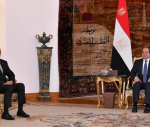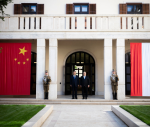You are here
Education experts urge prompt implementation of King’s discussion paper
By Laila Azzeh - Apr 18,2017 - Last updated at Apr 18,2017
In the 7th Discussion Paper, titled “Developing Human Resources and Education Imperative for Jordan’s Progress”, King Abdullah outlined the most pressing issues that need to be addressed in order for every Jordanian to have the opportunity to receive a quality education, to excel and to realise their fullest potential.
The King said that developing education is the “most rewarding investment”.
Educational experts interviewed by The Jordan Times considered the paper a “roadmap” which holistically shows the Royal vision of how education should be a catalyst for change in the Kingdom.
While stressing the significance of the paper, they voiced their concern, however, that its recommendations would not be promptly implemented by decision makers.
“The paper should be swiftly followed by an action plan. We do not have the luxury of time and His Majesty clearly stated this by calling for seizing the opportunities available in order to tap the potential of young Jordanians,” said Ronahi Majdalwi, a curricula and teaching expert.
In the paper, she added, King Abdullah has announced a “revolution” in education to empower Jordan to be at the forefront in efforts to overcome the challenges facing the region, especially extremism.
“This cannot be realised without setting benchmarks to evaluate our progress and to know why we messed up. Our ranking in national and international exams is going down due to the poor curricula,” Majdalwi said, noting that in many developed countries, the curricula is developed every two years and changed every seven years.
In the Discussion Paper, King Abdullah said that schools should identify students’ interests, harness their talents, build their capacities and serve as “incubators of change”, allowing students to graduate after they are equipped with the skills to face life challenges and build Jordan’s future.
“Schools should graduate students who know how to think, how to learn, how to seize opportunities and how to develop innovative problem-solving skills. This calls for a modern educational system that expands students’ horizons, teases their curiosity, and bolsters their sense of self-worth to assume their role as global citizens rooted in their Arab and Islamic identity and heritage,” the King said.
Suleiman Qadiri, a professor of science education at Al al Bayt University in Mafraq, 80km northeast of Amman, noted that His Majesty has “precisely diagnosed the weaknesses and strengths of national curricula in the paper, and has reminded people of a very important point: Jordanians are innovative by nature”.
“With a curriculum that entrenches critical and analytical thinking skills, our young people will be able to excel. I will not exaggerate by saying that all the old educational staff should be replaced in order to achieve this, but we need teachers who work as a “beehive” for the sake of the country’s prosperity,” Qadiri told The Jordan Times.
As an expert in schools’ science textbooks, he described the current curricula as “weak” and reliant on quantity rather than quality.
“The educational process is similar to an orchestra; all the pillars should work in harmony to bring about the change that we desire,” noted Qadiri, who called for institutionalising the educational system, “instead of leaving it in the hands of ministers who each come with a different approach and vision”.
Professor Talal Zu’bi, a curriculum expert from Al Hussein Bin Talal University in Maan, 220km south of Amman, agreed, saying textbooks for each grade are put by different authors for all grades.
“For example, science books for the fifth grade are put by five experts. A different team is responsible for authoring the sixth grade’s science book. This is illogical and hinders the flow, integration and continuation of the learning process,” he noted.
The experts underlined the need to empower teachers to enable them to empower young people.
“The King made it clear that the pursuit of knowledge requires confident and determined individuals who are open to all cultures and values, and this cannot be achieved without teachers who possess all these qualities,” said Majdalawi.
The King highlighted that such a vision is only attainable if all are united — citizens, government, and public and private institutions — working together to ensure an enabling environment which addresses the need to build capacities through an effective education system that delivers, and is led by, men and women from across the spectrum of Jordanian society.
On the skills that students should master, Qadiri noted that His Majesty cited the main areas of knowledge that scholars should acquire to excel in the 21st century, including computer and Internet literacy, major languages, communication skills, thinking and analytical skills.
“The King was clear in his message; only the distinguished will be able to compete in the future; not the ordinary and certainly not those who are below average. The skills His Majesty mentioned are what will enable Jordanians to compete and be in demand,” he added.
King Abdullah also noted that “mastering Arabic is a must”, a statement which was praised by Khalid Karaki, president of the Jordan Academy of Arabic, who added that the paper has clearly stated “that Jordan stands beside the Arabic language”.
“The King focused on the need to pay attention to Jordanians’ mother tongue, in addition to other international languages. Arabic is essential for Jordanians to understand their heritage and develop their sense of belonging,” said Karaki in a statement to the Jordan News Agency, Petra.
On the Education Ministry’s official website, Education Minister Omar Razzaz commended the 7th Discussion Paper for focusing on education and human resources as the main wealth of Jordan.
Razzaz added that the paper shed light on ways to qualify teachers and students to be innovative enough to cope with the accelerating change witnessed in the current era.
Related Articles
AMMAN — Parents of students and teachers at private schools commended the government’s decision to regulate tuition fees and salaries of tea
AMMAN — The number of students able to read with comprehension in the second and third grade increased by 15 per cent since 2015, according
AMMAN — The Cabinet on Sunday approved the mandating reasons for the by-law of the national centre for developing curricula to be sent to th















